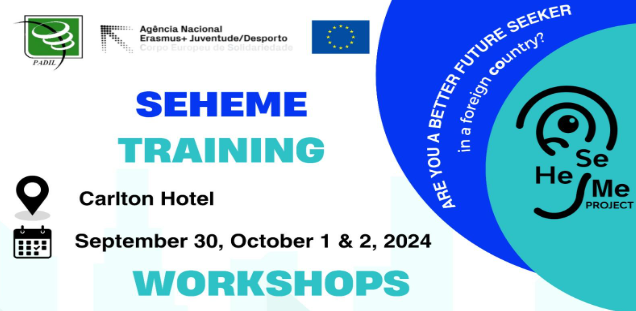Articles
Empowering Voices and Building Skills: An Innovative Methodology for Migrants and International Students in the Erasmus KA220 SeHeMe Project
25 September, 2024

Ines MANSOURI from PADIL
The Erasmus KA220 SeHeMe Project’s Learning Teaching Training Activity (LTTA) introduces a transformative educational methodology that emphasises public speaking, media literacy, and critical reflection. Designed to support migrants, international students, and individuals with a migration background, this approach builds confidence and encourages active participation, fostering skills essential for effective communication, self-expression, and social integration.
1. The On-Stage Methodology: Bridging Gaps through Public Speaking
Public speaking exercises play a pivotal role in this methodology. For migrants and international students, finding the confidence to express themselves in a new cultural context can be daunting. The structured, supportive environment provided by the LTTA offers participants the space to articulate their views and refine their self-expression. Through preparing and delivering speeches on causes they are passionate about, participants not only build communication skills but also strengthen their sense of advocacy, preparing them for meaningful social and professional engagements.
2. Media Literacy: Equipping Participants to Navigate Information Critically
Media literacy is another key pillar of this methodology, empowering participants to critically assess and navigate media landscapes. In today’s digital world, where information is plentiful yet often unreliable, media literacy skills are vital. Migrants and individuals with diverse backgrounds face unique media challenges, including encountering narratives that may reinforce stereotypes or misrepresent their experiences. By developing media literacy, participants gain tools to evaluate media messages, identify bias, and form informed perspectives.
This skill allows them to interact confidently with media and even produce content that authentically reflects their perspectives and values. Media literacy nurtures an active engagement with the media, empowering participants to shift from passive consumption to proactive, informed interaction with news and social platforms.
3. Networking and Community Building: Creating Supportive Spaces
The LTTA methodology also prioritizes community building and networking, recognizing the need for migrants and international students to connect with others who share similar experiences. Group discussions and collaborative activities offer a space where participants can share stories and establish connections, easing feelings of isolation and fostering a sense of belonging.
Networking within this supportive setting extends beyond social interaction. It offers valuable opportunities for professional growth, connecting participants with mentors, trainers, and peers who provide guidance and insight. Such connections not only enrich participants’ personal lives but also help them build networks that support their career aspirations and integration into new environments.
4. Conclusion: A Comprehensive Approach to Social and Personal Empowerment
The Erasmus KA220 SeHeMe Project’s LTTA combines multimedia storytelling, public speaking, media literacy, and networking in a supportive, interactive format. Tailored to address the needs of migrants, international students, and those with a migration background, the methodology empowers participants to transition confidently into engaged, critically aware members of their communities.
This methodology fosters skills and confidence essential for participants to advocate for themselves, engage in public discourse, and contribute to societal dialogues. By addressing personal development through a structured yet inclusive framework, the SeHeMe LTTA provides a pathway for participants to actively shape their futures and connect across cultural boundaries, building empowered, informed communities across Europe.
